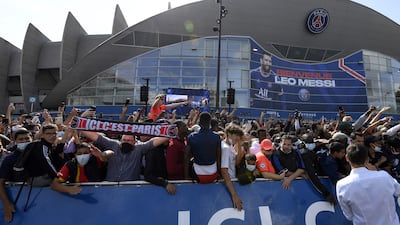Who is the face of La Liga for the new season, which starts on Friday? It’s a slightly uncomfortable question for Spanish football, suddenly shorn of stars it imagined were a permanent part of the furniture.
For the first time in almost a decade and half, a Liga season will begin this weekend without the best footballer on the planet involved. As long as Lionel Messi was at Barcelona, Spain was home to the sport’s greatest individual treasure. Even in the years when Messi was being challenged for his status as the world’s number one player, the challenger was at Real Madrid, where Cristiano Ronaldo played for nine gilded years.
Both are now elsewhere. There is no softening the blow of Messi’s abrupt departure to join Paris Saint-Germain and the impact spreads well beyond Camp Nou, where Barca’s executives cited La Liga’s own salary-cap rules as a principal reason why they could not renew their 21-year bond with Messi, 34. So La Liga itself stands squarely accused of forcing its great superstar away by imposing a system of financial self-discipline on clubs which is more stringent than equivalent rules in other countries.
Messi is not the only high-profile departure, either. In the last five summers, Neymar, Ronaldo, Messi and Sergio Ramos have all left Barcelona or Real Madrid.
Barcelona at least recouped a world record fee, €222m, by reluctantly selling Neymar to PSG in 2017. Madrid sold Ronaldo, in his mid-30s to Juventus for around €100m a year later. But there are barcelonistas and madridistas who would point out their clubs have not won a Champions League since those departures; in the 10 seasons between 2009 and 2018, the European Cup was won seven times by either Barca or Madrid.
This summer, the formal goodbyes of Messi and Ramos, Barcelona and Madrid captains until they left, carried a sombre, defeatist tone. “I wanted to stay,” insisted Messi. Ramos said the same at his farewell press conference. In the one case debt-laden Barcelona told their greatest ever player he could not stay on the payroll, not even with the 50 per cent pay cut he had volunteered to take. In the other, Madrid would only commit to one more season of Ramos, 36, and he wanted two.
PSG snapped up both, on free transfers, fomenting further envy across the Spanish-French border at the resources France’s wealthiest club enjoys thanks to its Qatari benefactors. Barcelona and Madrid feel unable to compete with that, weakened by the economic hardship brought on by Covid-19 restrictions against which the likes of PSG, and the richer Premier League clubs seem immune.
As Messi told El Pais yesterday. “It will be hard for Barcelona and Madrid, but in a few years they will bounce back, and the stars will start going back there again. La Liga is still a great, strong competition.”
But it is not exactly a united, happy family. Clubs across the top two divisions in Spain yesterday voted in favour of a €2.7bn investment from CVC Capital Partners that grants CVC a little over 10 percent of La Liga’s media rights over the next 50 years. Barcelona and Madrid opposed the deal; 38 of the other 40 first and second tier clubs approved it.
Fresh revenue is needed, and with the prospects of crowds returning, albeit gradually, to stadiums amid confidence the public health crisis is easing, there can be cautious optimism. But the days when Barcelona would, year on year, spend in excess of €100m on one player - Ousmane Dembele in 2017, Philippe Coutinho in 2018, Antoine Griezmann in 2019 - are long gone.
None of those signings have truly thrived. Nor has Eden Hazard, the last €100m-plus Madrid recruit. Hazard begins his third season in Spain desperate to make amends for the limp, injury-hit story of his Madrid career so far.
Neither Real Madrid nor Barcelona are the current champions. Atletico Madrid on Sunday begin their defence of the title they won in the most nail-biting, gripping circumstances in May, armed with a squad strengthened by the addition of Argentinian midfielder Rodrigo De Paul and confident that Luis Suarez, the hero of last season, is still feisty and ambitious into his 35th year.
If Barcelona and Madrid feel orphaned by the exit of their captains, Atletico boast an enviable stability. In December, their inspiring, teak-tough head coach Diego Simeone will celebrate a decade at the helm.
Who is the face of La Liga? If Spanish football needs a face to advertise resilience and endurance, then the face of La Liga should really be Simeone.



























